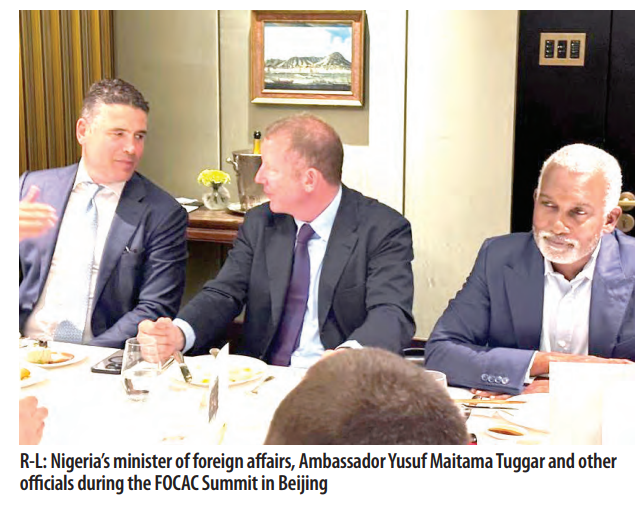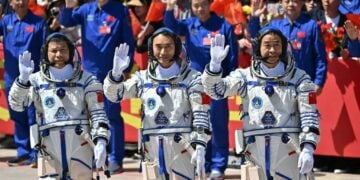The Nigerian Government, along with other African nations, actively participated in the 2024 Summit of the Forum on China-Africa Cooperation (FOCAC) held in Beijing, China from September 4 to 6, 2024.
Since the establishment of FOCAC in 2000 and the China-Africa Development Fund in 2006, China’s economic ties with Africa have significantly deepened. During this year’s FOCAC Summit, Chinese President Xi Jinping outlined bold new investment initiatives for African countries, amounting to billions of dollars.
In specific terms China- Nigeria bilateral ties have improved over the years with impressive Chinese investment in infrastructure in Nigeria with billions of dollars and enhancing the capacity of Nigerians and creating employment.
Perhaps the most important takeaway of this year’s FOCAC summit was the strengthening of bilateral ties between Nigeria and China with the establishment of Comprehensive Strategic Partnership between both countries and building a high-level China-Nigeria Community with a shared future.
Nigeria’s Minister of Foreign Affairs, Ambassador Yusuf Maitama Tuggar, stated that President Bola Ahmed Tinubu’s official visit to China and Nigeria’s participation in the 2024 FOCAC Summit has led to the strengthening of bilateral and diplomatic relations between the two countries.
The Minister, speaking on the outcomes of the visit and the joint statement issued by both countries stated that “China appreciates the efforts of Nigeria in enhancing regional peace and solidarity and promoting regional integration, with a strong emphasis on respecting democracy, good governance, and the rights of citizens.
“China supports the West African countries in addressing differences through friendly dialogue and consultations and to carry forward the regional integration. In this regard, China also urges other international actors to refrain from actions that could turn the region into a space for geopolitical contestation.”
Tuggar also noted that “China commended Nigeria’s leading role in ECOWAS and its efforts towards bringing stability to the region; it supports Nigeria to play a strong leading role in the regional affairs including the fight against terrorism and managing differences. The two sides agreed to stay committed to safeguarding peace, security, and stability in the region, including the Sahel and Gulf of Guinea.”
According to Tuggar, the two countries agreed to strengthen their relationship and cooperation based on the following cardinal principles: Building High-Level Strategic Mutual Trust. The two sides noted that over half a century since the establishment of diplomatic ties between the two countries, both countries have shown respect to each other and treated each other as equals.
The relationship between the two countries has withstood the test of international changes, the mutual trust has been enhanced continuously, practical cooperation has yielded fruitful outcomes, and the two countries have embarked on a path of seeking strength through unity for win-win cooperation, the statement said.
The two sides reaffirmed their firm support to each other on issues related to their respective core interests and major concerns, particularly sovereignty and territorial integrity. The Chinese side supports the Renewed Hope Agenda of Nigeria, and the efforts made by Nigeria in maintaining national unity, peace, security and social stability, as well as promoting economic development and improving people’s welfare.
The Nigeria side firmly adhered to the one-China principle, acknowledged that there is but one China in the world, and the government of the People’s Republic of China is the sole legal government representing the whole of China, adding that Taiwan is an inalienable part of China’s territory.
Nigeria also applauded and supported the vision of Building a Community with a Shared Future for Mankind, The Belt and Road Initiative (BRI), the Global Development Initiative (GDI), the Global Security Initiative (GSI), and the Global Civilisation Initiative (GCI) proposed by President Xi Jinping.
Both sides pledged to support each other’s efforts in multilateral affairs including the UN, the G20 and BRICS. They agreed to support the increased calls for UN Security Council reforms with balanced geographical representation to reflect current geo- political realities. Both countries agreed that human rights including the right to development are a common cause of all of humanity, and opposed the politicisation of human rights issues i.e. the interference in other countries’ internal affairs under the pretext of human rights.
China welcomed Nigeria to expand trade between the two countries through platforms such as the China International Import- Expo (CIIE) the China – Africa Economic and Trade Expo (CAETE) and the China Import and Export Fair (the Canton Fair), Lagos and Abuja.
Nigeria welcomed the Global Initiative for Artificial Intelligence (AI) Governance, and Global Initiative on Data Security proposed by the Chinese side and appreciated China’s efforts in promoting the rights of developing countries in artificial intelligence, network, data, and other fields.
The two sides agreed to deepen cooperation on the infrastructure connectivity between the two countries. China proactively supported Nigeria in developing its domestic infrastructure construction including transportation, ports and free trade zones towards achieving integrated development connection for industries.
They pledged to make joint efforts to fully support Nigeria’s geographical and development advantage in West Africa to establish Africa’s flagship projects on cross-national and cross-regional cooperation.
Both countries encouraged flexible and diverse regional monetary and financial cooperation such as local currency swaps, to facilitate trade between China and Nigeria and make contributions to global financial stability.
The two countries agreed to carry out international cooperation on financial intelligence on anti-monetary laundering/ countering the financing of terrorism (AML/CFT) and Nigeria’s efforts to safeguard the order of its financial and foreign exchange markets, and to crack down on financial crimes including money laundering.
They expressed commitment to supporting the WTO-focused multilateral trading system, opposing trade protectionism, promoting trade and investment liberalisation and facilitation, and creating a transparent and non-discriminatory business environment for cooperation between the two countries.





